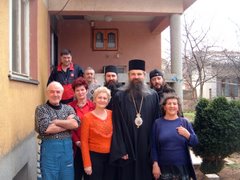Ahtisaari Proposal Will Pave Way For Independence
Dear Readers,
This proposal of Ahtisaari is a ploy into trying to trick the American people and the Russian Federation into supporting at least eventual independence of Kosovo. No Independence For Kosovo simply means No. It means no now and it means no forever. We must see through the deception and I am sure that Kostunica and Putin already do. The Serbian Goverment will have the resources it needs to deal with the economic and social needs of all the citizens of Kosovo. God Himself will see to it. The region will pull together and help each other in unprecedented ways. Please allow them to take care of all their citizens. Educate yourselves.
SIGN THE PETITION
http://www.ipetitions.com/petition/savekosovo-metohija/
NO INDEPENDENCE FOR KOSOVO
Anticipated Proposal Will Offer Graduated Independence
PRISTINA, Serbia (Reuters) - Kosovo will gain access to international institutions under a U.N. package that Germany and Britain say will lead to independence for the breakaway Serbian province.
A plan to be presented to major powers on Friday is expected to "advocate independence for Kosovo but with limits on its sovereignty," German deputy foreign minister Gernot Erler told Reuters in Berlin.
Independence is demanded by the 90-percent ethnic Albanian majority in Kosovo, which was occupied by NATO in 1999 to end a counter-insurgency war and has been run by the
United Nations ever since. Serbia insists it must retain sovereignty.
In the Kosovo capital, Pristina, British Foreign Office political director John Sawers said the six Contact Group powers agreed a solution "should be acceptable to the great majority of the people of Kosovo, and I think that speaks for itself." Political and diplomatic sources, speaking on condition of anonymity, gave details of the proposal U.N. envoy Martti Ahtisaari would discuss with representatives of Russia, the United States, Britain, France, Italy and Germany on Friday. It states that Kosovo should be given "the right to seek membership of international organizations and institutions."
A Western official said these could include the United Nations, the International Monetary Fund (IMF) and the World Bank although none were identified in the text of the document. If it passes the U.N. Security Council Kosovo would become Europe's newest independent state and the last to be carved from what was once Yugoslavia.
RIGHT OF VETO
Russia, a friend of Serbia's with the right of veto in the Security Council, says there can be no deal unless both sides agree. German Foreign Minister Frank-Walter Steinmeier said he expected "a solution which will not be vetoed by Russia."
Diplomats say Russia may block Kosovo's membership of the U.N. but access to the World Bank and IMF will in the long run prove more important to the poor territory.
Ahtisaari, who mediated months of largely fruitless talks between the two sides last year, was due to present his proposal on a visit to Serbia and Kosovo on February 2, after which a fresh round of meetings would be conducted. "I don't think there's going to be a fundamental renegotiation of the whole process," Sawers cautioned. Contrary to Serbian reports that the deal would be re-opened, the new talks would simply involve "fine-tuning" of the proposal.
Publication of the Kosovo plan was postponed from the end of 2006 to prevent it influencing a parliamentary election in Serbia, where ultranationalists are still strong.
The election was held on Sunday but failed to produce a clear majority and Serbia now looks headed for lengthy coalition talks just as the fateful plan for its province is launched.
Serbia's main party leaders all reject independence but are divided on how to resist an international solution.
The pro-Western Democratic Party of Serbia's President Boris Tadic appealed to Ahtisaari to delay publication further. "Some speedy move on Kosovo could make formation of a democratic government more difficult, and that is not in anyone's interest," said Bozidar Djelic, the party's candidate for prime minister. "These are delicate issues and we have to have full control over things such as the armed forces," he said.
Prime Minister Vojislav Kostunica who is key to a coalition deal and is seeking a new mandate, said he did not care what Ahtisaari did because Serbia was unanimously opposed to independence for Kosovo and had Russia to back it up. "It is absolutely irrelevant when (Ahtisaari) will give his proposal, before or after the government is formed," he said.
(Additional reporting by Noah Barkin in Berlin, Fatos Bytyci in Pristina and Douglas Hamilton in Belgrade)
Lessons of parliamentary elections in Serbia
19:31
24/ 01/ 2007
MOSCOW. (Pyotr Iskanderov for RIA Novosti) - Last Sunday's parliamentary elections in Serbia were indicative in many respects. They cast a new light on domestic political processes, prospects of Kosovo settlement and the future of Serbia's relations with the European Union (EU). Moreover, they are bound to affect the destiny of breakaway republics on post-Soviet territory. Preliminary results of the voting suggest the first conclusion - it was wrong to talk about voter apathy in Serbia. Over 60% of eligible voters have turned up at the polling stations - more than for elections held in the past few years. This fact not only attests to the Serbians' high political activity but also shows that the elections fairly and legitimately reflect the domestic situation.
Secondly, two formerly influential forces - the Socialist Party and the Serbian Renewal Movement (SPO) - have actually left the political scene. The former has barely passed a 5% threshold needed to win seats in parliament. The latter has remained without a faction in parliament, which is a heavy blow to SPO leader and current Foreign Minister Vuk Draskovic.
Thirdly, the results of the elections are particularly alarming for the West. The Serbian Radical Party (SRS) is still the leading political force in the country. Its leader Vojislav Seselj has been on trial in the Hague since February 2003. It is an open secret that in the past few months, the West was doing all it could to secure success in the elections for the loyal parties, first and foremost, the Democratic Party (DP) headed by the current President Boris Tadic. UN envoy for Kosovo Martti Ahtisaari even broke his promise to resolve the Kosovo problem by the end of 2006. He delayed the publication of his plan till late January to prevent the Serbian authorities from having to choose between Kosovo and European integration. But this tactic has failed, and in preliminary estimates the DP has received less than 23% votes, which is a clear setback considering powerful propaganda support for its campaign at home and abroad.
As a result, the parliamentary majority will go to the fierce opponents of Kosovo's separation from Serbia. Unlike Boris Tadic, who called on the Serbian voters to accept Kosovo's potential loss, even his colleague in the democratic camp, DP leader Vojislav Kostunica, promised to do all he could against Kosovo's cessation, and actually sided with the radicals on this score. The Socialists, an opposition party, are most likely to vote against the Ahtisaari plan, all the more so if it is brought to parliament by the much-hated President Tadic. The DP and the other emphatically pro-Western party of Liberal Democrats (LDP), which has been elected to parliament, will not have enough votes to let it approve Kosovo's independence.
Moreover, it may happen that the forces united under the democratic opposition banner since the times of Milosevic will not be able to form a valid government. Despite a relative setback of his party, Vojislav Kostunica is not going to give up his premiership to a DP candidate and will need SRS support for this. A vague situation and political bargaining may last for three months (this is the term assigned by the Serbian constitution for the government's formation) and eventually lead to parliament's dissolution and new elections, at which the voters, disappointed over the squabble among the Democrats, are most likely to give even more support to the opposition radicals.
To sum up, the Sunday elections in Serbia have increased the likelihood of a scenario that has been a nightmare for the Kosovo separatists and their Western soul mates for a long time. If the Serbian parliament refuses to recognize Kosovo's independence, its cessation can only be imposed on Belgrade by force. This is exactly the case against which President Vladimir Putin has warned more than once. He is firmly resolved not to allow the UN Security Council to pass a decision on Kosovo that would be unacceptable for Belgrade. It is clear what he meant as the head of a state with the right to veto in the UN Security Council.
The leaders of the breakaway republics on post-Soviet territory should draw their own conclusion from the elections in Serbia. I think they will become even more disappointed with the ability of the Western leaders and international officials to exert effective influence on the domestic situation in foreign countries. Consolidation of the supporters of united Serbia may provide only a scant relief to Chisinau and Tbilisi. The Serbians' resolve to determine the destiny of their country without any outside interference fully conforms to the aspirations of breakaway republics. Hence, the idea of national self-determination will receive a new impetus in Transdnestr, Abkhazia and South Ossetia. Pyotr Iskanderov, Institute of Slavic Studies at the Russian Academy of Sciences. The opinions expressed in this article are those of the author, and may not necessarily coincide with the opinions of the editorial board.

















